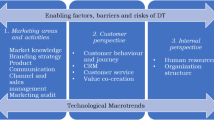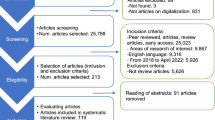Abstract
Adoption of digital novel technologies (DNT) is an important phenomenon faced by managers that is attracting emergent research attention. Although previous research establishes that DNT in general enhance business performance, more recent theorizing suggests that this may not always be the case. Notwithstanding, researchers have paid little attention to contingency conditions that may affect the strength and nature of the relationship between DNT and marketing performance. By examining organizational factors that moderate the DNT–performance relationship, this study explores types of firm for which DNT are particularly beneficial. Based on survey data from firms and empirical analyses, findings indicate that firms pursuing agility and digital business transformation strategies are in a favorable position to achieve better performance when adopting DNT. Additionally, the DNT–performance link is stronger for smaller, product-based firms, regardless from B2B/B2C sectors. The study sheds light on the vision of Industry 4.0 transition with implications for academics. Executives evaluating the adequacy of DNT adoption should consider certain contingencies advanced in this research.

Similar content being viewed by others
References
Abrantes, Bruno F., and Klaus Grue Ostergaard. 2022. Digital footprint wrangling: Are analytics used for better or worse? A concurrent mixed methods research on the commercial (ab)use of dataveillance. Journal of Marketing Analytics 10: 1–20.
Agnihotri, R., K.A. Bakeshloo, and S. Mani. 2023. Social media analytics for business-to-business marketing. Industrial Marketing Management 115: 110–126.
Aguinis, H., J.R. Edwards, and K.J. Bradley. 2017. Improving our understanding of moderation and mediation in strategic management research. Organizational Research Methods 20 (4): 665–685.
Armstrong, J.S., and T.S. Overton. 1977. Estimating nonresponse bias in mail surveys. Journal of Marketing Research 14 (August): 396–402.
Asseraf, Y., and I. Gnizy. 2022. Translating strategy into action: The importance of an agile mindset and agile slack in international business. International Business Review 31 (6): 102036.
Asseraf, Y., and I. Gnizy. 2023. Slowing down to speed up: Decision-making styles and international marketing agility. European Journal of International Management 1 (1): 1.
Bagozzi, R.P., and Youjae Yi. 1988. On the evaluation of structural equation models. Journal of the Academy of Marketing Science 16 (1): 74–94.
Bharadwaj, A., O.A. El Sawy, P.A. Pavlou, and N. Venkatraman. 2013. Digital business strategy: Toward a next generation of insights. MIS Quarterly 37 (2): 471–482.
Bondar, S., J.C. Hsu, A. Pfouga, and J. Stjepandić. 2017. Agile digital transformation of system-of-systems architecture models using Zachman framework. Journal of Industrial Information Integration 7: 33–43.
Cao, G., and J. Weerawardena. 2023. Strategic use of social media in marketing and financial performance: The B2B SME context. Industrial Marketing Management 111: 41–54.
Ciulli, F., and A. Kolk. 2023. International Business, digital technologies and sustainable development: Connecting the dots. Journal of World Business 58: 101445.
Collet, B., and E. Rémy. 2023. Exploring the (un) changing nature of cultural intermediaries in digitalised markets: Insights from independent music. Journal of Marketing Management 39 (5–6): 443–469.
Dalenogare, L.S., G.B. Benitez, N.F. Ayala, and A.G. Frank. 2018. The expected contribution of Industry 4.0 technologies for industrial performance. International Journal of Production Economics 204: 383–394.
Dar, Imran Bashir, Muhammad Bashir Khan, Abdul Zahid Khan, and Bahaudin G. Mujtaba. 2021. A qualitative analysis of the marketing analytics literature: Where would ethical issues and legality rank? Journal of Marketing Analytics 9 (3): 242–261.
Davenport, T., A. Guha, D. Grewal, and T. Bressgott. 2020. How artificial intelligence will change the future of marketing. Journal of the Academy of Marketing Science 48 (1): 24–42.
Diaz, E., A. Esteban, R. Carranza Vallejo, and D. Martin-Consuegra Navarro. 2022. Digital tools and smart technologies in marketing: A thematic evolution. International Marketing Review 39 (5): 1122–1150.
Fernandez-Vidal, J., F.A. Perotti, R. Gonzalez, and J. Gasco. 2022. Managing digital transformation: The view from the top. Journal of Business Research 152: 29–41.
Fornell, C., and D.F. Larcker. 1981. Evaluating structural equation models with unobservable variables and measurement error. Journal of Marketing Research 18: 39–50.
Gardiner, S.P. 2019. Do luxury car brands market premium status in a world of likes, followers, and user-generated content. Journal of Marketing Management 7 (2): 18–27.
Gastaldi, L., S. Lessanibahri, G. Tedaldi, and G. Miragliotta. 2022. Companies’ adoption of Smart Technologies to achieve structural ambidexterity: An analysis with SEM. Technological Forecasting and Social Change 174: 121187.
Gnizy, I. 2019. Big data and its strategic path to value in international firms. International Marketing Review 36 (3): 318–341.
Gnizy, I. 2020. Applying big data to guide firms’ future industrial marketing strategies. Journal of Business and Industrial Marketing. https://doi.org/10.1108/JBIM-06-2019-0318.
Gnizy, I., J.W. Cadogan, J.S. Oliveira, and A. Nizam. 2017. The empirical link between export dispersion and export performance: A contingency-based approach. International Business Review 26 (2): 239–249.
Gunasekaran, Angappa, Thanos Papadopoulos, Rameshwar Dubey, Samuel Fosso Wamba, Stephen J. Childe, Benjamin Hazen, and Shahriar Akter. 2017. Big data and predictive analytics for supply chain and organizational performance. Journal of Business Research 70: 308–317.
Hair, F.J., Jr., W.C. Black, B.J. Babin, and R.E. Anderson. 2010. Multivariate data analysis, 7th ed. Upper Saddle River: Prentice Hall.
Hallikainen, H., E. Savimäki, and T. Laukkanen. 2020. Fostering B2B sales with customer big data analytics. Industrial Marketing Management 86: 90–98.
Harrison, Dana E., and Haya Ajjan. 2019. Customer relationship management technology: Bridging the gap between marketing education and practice. Journal of Marketing Analytics 7: 205–219.
Hofacker, C., I. Golgeci, K.G. Pillai, and D.M. Gligor. 2020. Digital marketing and business-to-business relationships: A close look at the interface and a roadmap for the future. European Journal of Marketing 54 (6): 1161–1179.
Hollebeek, L.D., V. Kumar, R.K. Srivastava, and M.K. Clark. 2023. Moving the stakeholder journey forward. Journal of the Academy of Marketing Science 51 (1): 23–49.
Hughes, M. 2018. Organisational ambidexterity and firm performance: Burning research questions for marketing scholars. Journal of Marketing Management 34 (1–2): 178–229.
Ivaninskiy, I., and I. Ivashkovskaya. 2022. Are blockchain-based digital transformation and ecosystem-based business models mutually reinforcing? The principal–agent conflict perspective. Eurasian Business Review 12 (4): 643–670.
Jung, S.U., and V. Shegai. 2023. The impact of digital marketing innovation on firm performance: Mediation by marketing capability and moderation by firm size. Sustainability 15 (7): 5711.
Kassemeier, R., S. Alavi, J. Habel, C. Schmitz, and J. Wieseke. 2023. Guest editorial: Value-creating sales and digital technologies. European Journal of Marketing 57 (3): 653–658.
Kostyk, A., and J. Sheng. 2023. VR in customer-centered marketing: Purpose-driven design. Business Horizons 66 (2): 225–236.
Kraus, S., P. Jones, N. Kailer, A. Weinmann, N. Chaparro-Banegas, and N. Roig-Tierno. 2021. Digital transformation: An overview of the current state of the art of research. SAGE Open. https://doi.org/10.1177/21582440211047576.
Lindell, M.K., and D.J. Whitney. 2001. Accounting for common method variance in cross-sectional research designs. Journal of Applied Psychology 86 (1): 114–121.
Liu, Y., A. Soroka, L. Han, J. Jian, and M. Tang. 2020. Cloud-based big data analytics for customer insight-driven design innovation in SMEs. International Journal of Information Management 51: 102034.
Marzi, Giacomo, Anna Marrucci, Donata Vianelli, and Cristiano Ciappei. 2023. B2B digital platform adoption by SMEs and large firms: Pathways and pitfalls. Industrial Marketing Management 114: 80–93.
McGuirk, M. 2023. Performing web analytics with Google Analytics 4: A platform review. Journal of Marketing Analytics 11: 1–15.
Michis, Antonis A. 2023. Retail distribution evaluation in brand-level sales response models. Journal of Marketing Analytics 11 (3): 366–378.
Mingione, M., and R. Abratt. 2020. Building a corporate brand in the digital age: Imperatives for transforming born-digital startups into successful corporate brands. Journal of Marketing Management 36 (11–12): 981–1008.
Morgan, N.A., S. Jayachandran, J. Hulland, B. Kumar, C. Katsikeas, and A. Somosi. 2022. Marketing performance assessment and accountability: Process and outcomes. International Journal of Research in Marketing 39 (2): 462–481.
Mustafa, G., H. Solli-Sæther, V. Bodolica, J.I. Håvold, and A. Ilyas. 2022. Digitalization trends and organizational structure: Bureaucracy, ambidexterity or post-bureaucracy? Eurasian Business Review 12 (4): 671–694.
Nasiri, M., J. Ukko, M. Saunila, and T. Rantala. 2020. Managing the digital supply chain: The role of smart technologies. Technovation 96: 102121.
Pauwels, Koen, Michael Peran, Zee Shah, German Schnaidt, and Dauwe Vercamer. 2023. Sponsored brands video rings up clicks and sales in the short and long run. Journal of Marketing Analytics 11 (3): 275–286.
Petrescu, M., and A.S. Krishen. 2023. Mapping 2022 in Journal of Marketing Analytics: What lies ahead? Journal of Marketing Analytics 11 (1): 1–4.
Pires, C.P., S. Sarkar, and L. Carvalho. 2008. Innovation in services—How different from manufacturing? The Service Industries Journal 28 (10): 1339–1356.
Plangger, Kirk, Dhruv Grewal, Ko. de Ruyter, and Catherine Tucker. 2022. The future of digital technologies in marketing: A conceptual framework and an overview. Journal of the Academy of Marketing Science 50 (6): 1125–1134.
Podsakoff, P.M., S.B. MacKenzie, J.-Y. Lee, and N.P. Podsakoff. 2003. Common method biases in behavioral research: A critical review of the literature and recommended remedies. Journal of Applied Psychology 88 (5): 879–903.
Romero, D., P. Gaiardelli, G. Pezzotta, and S. Cavalieri. 2019. The impact of digital technologies on services characteristics: towards digital servitization. In Advances in production management systems. Production management for the factory of the future: IFIP WG 5.7 international conference, APMS 2019, Austin, TX, USA, September 1–5, 2019, Proceedings, Part I, 493–501. Springer.
Shah, Denish, and B.P.S. Murthi. 2021. Marketing in a data-driven digital world: Implications for the role and scope of marketing. Journal of Business Research 125: 772–779.
Siqueira Junior, J.R., E. ter Horst, G. Molina, L.H. Gunn, F. Reinoso-Carvalho, B. Sezen, and N. Peña-García. 2023. Branding in the eye of the storm: The impact of brand ethical behavior on brand commitment during the COVID-19 crisis in a South American country. Journal of Marketing Analytics 11 (1): 95–115.
Steenkamp, Jan-Benedict E.M.., and H. Baumgartner. 1998. Assessing measurement invariance in cross-national consumer research. Journal of Consumer Research 25 (1): 78–107.
Utami, H.N., E. Alamanos, and S. Kuznesof. 2021. A social justice logic’: How digital commerce enables value co-creation at the bottom of the pyramid. Journal of Marketing Management 37 (9–10): 816–855.
Zhang, Feng, Bin Yang, and Lei Zhu. 2023. Digital technology usage, strategic flexibility, and business model innovation in traditional manufacturing firms: The moderating role of the institutional environment. Technological Forecasting and Social Change 194: 122726.
Funding
None.]
Author information
Authors and Affiliations
Corresponding author
Ethics declarations
Conflict of interest
None.
Additional information
Publisher's Note
Springer Nature remains neutral with regard to jurisdictional claims in published maps and institutional affiliations.
Rights and permissions
Springer Nature or its licensor (e.g. a society or other partner) holds exclusive rights to this article under a publishing agreement with the author(s) or other rightsholder(s); author self-archiving of the accepted manuscript version of this article is solely governed by the terms of such publishing agreement and applicable law.
About this article
Cite this article
Gnizy, I. When and how digital novel technologies matter to firm marketing performance. J Market Anal (2024). https://doi.org/10.1057/s41270-024-00288-0
Revised:
Accepted:
Published:
DOI: https://doi.org/10.1057/s41270-024-00288-0




